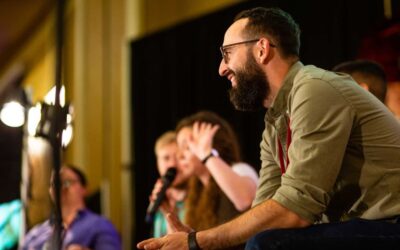What is Deconstruction?
What is the definition of Deconstruction?
How does Deconstruction affect faith and Christianity?
How do I start Deconstructing Christianity?
These are questions I get almost daily (these and a LOT more).
I recently wrote an article titled “The Age of Deconstruction and The Future of The Church.” It was featured on Relevant Magazine and caused quite a stir on social media (especially Relevant’s Facebook post).
Since then, I have had SEVERAL discussions with writers, podcasters, preachers, and everyday people who all seem to have very different definitions of “deconstruction.”
(If you are interested in listening to any of those podcasts, I have put a list of the episodes I have been on about deconstruction and a full page dedicated to deconstruction resources at the bottom of this article)
With hundreds of articles, books, podcasts, and social media accounts dedicated to deconstruction, there’s so much information out there it can get kind of confusing to really understand what we’re talking about. Everyone has a different definition of deconstruction in their head when they talk about it, so what does deconstruction mean…really?
So I think it would be beneficial to back up and define deconstruction for a minute.
At its most basic level,
deconstruction from a Christian lens means revisiting and reevaluating different beliefs that make up your faith.
That’s it.
Christian deconstruction became popularized by several sources, but perhaps the most notable leader in faith deconstruction is Richard Rohr, founder of the Center for Action and Contemplation in Albuquerque, New Mexico.
When Rohr talks about deconstruction, he refers to it as one of three macro stages of faith development and spiritual growth.
Construction
- The building of your faith, belief system, and worldview. Typically the result of your upbringing and the culture in which you were raised.
Deconstruction
- Revisiting and reevaluating those beliefs and paradigms. Like the demolition stage of a home renovation. You sometimes have to take things apart to see if they are still working correctly or if there has been any damage that needs to be cleaned out before rebuilding.
Reconstruction
- The building back of your faith with new and better information and experience. Again, like a home renovation, it is still the same home, just stronger, healthier, and better to live in.
This is the root of Christian deconstruction. It is a step in a process intended for growth, development, and a stronger worldview that can hold the tension of the world’s struggles combined with commitment to Jesus of Nazareth and his revelation.
Much of the confusion on definitions has come from deconstruction’s connection with deconstructionism, which is a philosophical and literary theory popularized by Jacques Derrida in the 1960s. It is important to note that these two have similar ideas, but ultimately ARE NOT related.
According to philosophybasics.com, the premise of deconstructionism is to “question traditional assumptions about certainty, identity, and truth.” Deconstructionism involves “discovering, recognizing, and understanding the underlying assumptions (unspoken and implicit), ideas, and frameworks that form the basis for thought and belief.”
Though deconstructionism and Christian deconstruction are not the same, I’d say they have some DEFINITE commonalities. But when it comes to how deconstruction affects LIVED LIFE, people who are “deconstructing their faith” are not talking about Deconstructionism.
Deconstructionism at its essence doesn’t have an end goal. It is not seeking to stop deconstructing and move on to the next stage. Deconstructionism is an end in and of itself.
Christian deconstruction or deconstructing faith is a natural, healthy, and VERY common season of life intended to bring us to a mature faith. A faith rooted in the person of Jesus and the mystery of God experienced in real life.
A good term I heard for it is “disentangling.”
We are disentangling our modern, western worldview from the message of Jesus which is universal and eternal. We are disentangling our systems of institutional church from the organic, global, united Body of Christ.
We are disentangling our limited view and understanding of scripture as the main authority in our life, and recalling that even Jesus said, “I am sending you a helper” (not a book), and “The Spirit will teach you all you need to know.”
Deconstruction leads us AWAY from the idea that we have to know the right answers and live them rightly in our lives, and TOWARD a faith that relies of the freedom, grace, and discipline of Jesus.
Mostly, it allows us to let go of the idol of certainty, and dwell in the paradoxes of life and death, freedom and servitude, grace and justice, love and truth.
Deconstruction is a stage of growth
It is not demolition.
Anyone approaching it as a dismantling or a demolishing of church or Christianity is not operating solely out of a response to the spirit of God. They are most likely responding to some unhealed trauma in their lives or the lives of others.
Deconstruction certainly comes with an element of anger and distrust, but it DOES NOT STAY THERE.
As a friend of mine posted recently,
“There are times to swing the hammer and you need to. But if the hammer is the only tool you know how to use, everything becomes a nail.”
For more on Christian Deconstruction, I have a full list of Deconstruction Resources including books, podcasts, guides, and more.
I am also a certified life coach working with those going through deconstruction. The worst thing to do is deconstruct in isolation. I’d love to meet you where you are and help navigate deconstruction with you if that would be of benefit to you.
Here is a list of podcast I was brought on to discuss deconstruction:
- Simple Ways to Have a Good Life
- The Reckless Pursuit
- Smoke and Water
- After Words Podcast
- Beyond Deconstruction
- Coming Soon

What is Deconstruction?







When talking to a pastor friend recently, he tried to convince me he had gone through deconstruction. Skeptical, I pushed him further. After thinking about it for a few minutes he then said, “Well, I guess I’ve deconstructed my beliefs about the CHURCH, but not my beliefs about God.” For me, this was a critical difference and one that I have seen pop up over and over in deconstructing conversations. Some of what you are saying seems to fall under this umbrella of deconstructing the “church”, I.e. systems, hierarchies, doctrines, social justice philosophies. For me, I guess I don’t see as much difference between deconstructing faith & deconstructionism (though I have not researched that term). In my humble opinion, if you don’t seek to deconstruct the identities you’ve built up for yourself as a christian (and eventually as a person, generally), youre only going halfway, or you’re stopping too early in the process. It seems like people get to a point where they think – “oh, ok. My beliefs caused me shame and so the solution is that I need new beliefs!” Hence, they begin reconstruction without fully undergoing the “death/crucifixion” necessary for resurrection. I do see deconstruction as a process/stage but I don’t think it has an end. Talking with Jane of the Waking House, we discussed how going through the eye of the needle is something only a truly “skinny”/naked soul can do. So then this lifetime is essentially a journey of letting go of the contents of the house (to use that analogy) and realizing you don’t actually need a house at all. I’ve been thinking about Jesus and how he was raised in a good, traditional Jewish household, did all the Jewish things – going to synagogue, apprenticeship under his dad (probably), but then one day he goes “Actually, I’m done with all this.” And he basically rejects the worldview he was raised with. Then he doesn’t come out with a new philosophy of building up, really, it’s taking things away. “Birds of the sky have nests but the son of man has no home.” “Who are my family? These are all my brothers and sisters…” He rejects the idea of establishing a new home or a new specialized community. Instead he defines himself in terms that defy definition! “Light of the world” “bread of life” “the vine” “I am the way.” He doesn’t recreate a new box for himself but essentially says that he is outside of any box. I’m still thinking this through, and maybe I don’t understand fully yet what Rohr means by Reconstruction, but at this point in my journey, I am deliberately choosing to NOT reconstruct, but to remain as open and free as possible, unencumbered by any certainties, and just living in the mystery and unknowing. Reconstruction at this point just sounds like finding something else to grab onto to prevent me from sitting with the discomfort of uncertainty. So, to that end, I do not see reconstruction as a necessary part of this journey. But, I reserve the right to change my mind tomorrow 🤣
I love so much about this comment. I won’t respond to all of it though as it definitely warrants a conversation to make sure we understand each other.
I am not sure that you can compartmentalize deconstruction too much. Deconstructing the church leads to questioning your views of God. When I talk about “moving on” from deconstruction what I typically mean is allowing yourself to rest in a place for a while. Whether that is embracing the unknowing as you described (which I love and am there in A LOT of christian topics), or choosing to follow a path for the time being (I still choose to believe God is good for now, even when there is a lot that could challenge that belief). Reconstruction is not really LANDING anywhere and planting your flag. It’s really just coming to a way of being that works BETTER for where you are, but is always open to changing as you continue your journey. So in that sense, deconstruction and reconstruction are FAR less about “stages” and really more like repeating patterns. This lines up SO MUCH BETTER with the Jewish (and Eastern) perspective that life if cyclical. Truth is spherical…not linear. The term Kairos refers to a time and interaction with God but the learning process within Kairos is a circle…not a stair step. Rohr knows this and speaks about it, but for the most simplistic explanation of Deconstruction/Reconstruction he talks about them as stages simply because it’s easier to explain. There’s always more behind what’s being said because we don’t have an abundance of time and attention to cover it all, you know?
I do think MOVING FORWARD is important. To keep reducing and reducing and only focus on “taking away” is not really growth. It is a part of growth but there must also be rediscovery and grace for the process for it to be truly beneficial (in my INCREDIBLY expert opinion…jk). Mystery is beautiful. It’s where I live most of the time. But in that mystery I ALSO dwell in trust. That is my “reconstruction.” I trust that God knows what he is doing and will guide me the whole way.
By the way…I need to check out your book! Where can I get it?